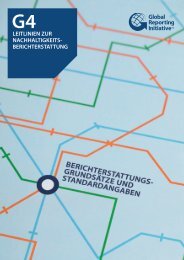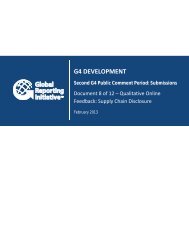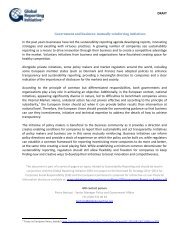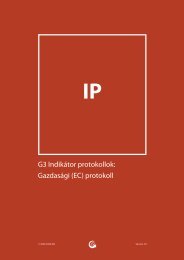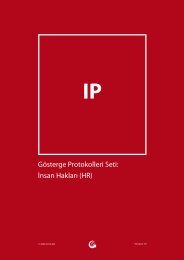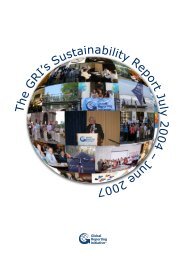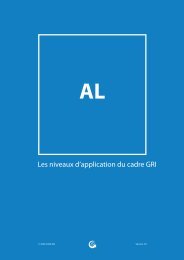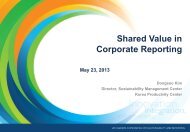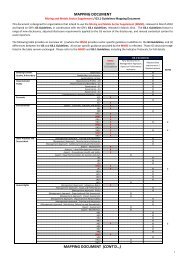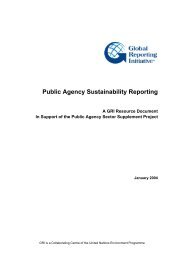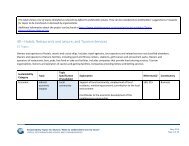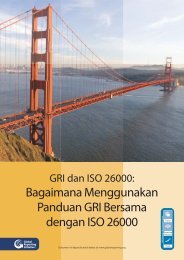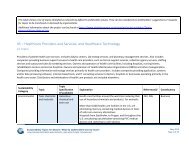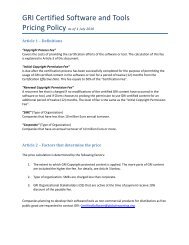CARROTS AND STICKS – PROMOTING ... - Global Reporting Initiative
CARROTS AND STICKS – PROMOTING ... - Global Reporting Initiative
CARROTS AND STICKS – PROMOTING ... - Global Reporting Initiative
Create successful ePaper yourself
Turn your PDF publications into a flip-book with our unique Google optimized e-Paper software.
Standards, Codes and Guidelines<br />
Economies (CERES) Principles (previously<br />
“Valdez”), 1992 were developed by CERES following<br />
the 1989 Exxon Valdez disaster. This ten-point code<br />
of conduct also introduced specific environmental<br />
reporting guidelines. Embedded in the code of<br />
conduct was the mandate to report periodically on<br />
environmental management structures and results.<br />
A driving force behind the launch of the GRI process<br />
in 1997, CERES continues to encourage corporate<br />
environmental responsibility through working with<br />
endorsing companies on meeting their commitment<br />
and reporting along the GRI Sustainability <strong>Reporting</strong><br />
Guidelines. http://ceres.org<br />
The<br />
� SA8000 standard is a voluntary, universal and<br />
auditable standard for decent work conditions that<br />
was developed by Social Accountability International,<br />
a multi-stakeholder NGO initiative. The SA8000<br />
standard is based on the core conventions of the<br />
International Labour Organisation, the United Nations<br />
Convention on the Rights of the Child, and the<br />
Universal Declaration of Human Rights. As of 30<br />
June 2009 there were 2,010 certified facilities, 64<br />
countries represented, 66 industries, and 1,119,145<br />
employees. www.sa-intl.org<br />
AA1000 AccountAbility Principles Standard<br />
�<br />
(AA1000APS), 2008 issued by the UK-based<br />
AccountAbility is used by organisations to develop an<br />
accountable and strategic response to sustainability,<br />
including reporting. It provides auditable criteria<br />
for each of the three principles of inclusiveness,<br />
materiality and responsiveness in the context of an<br />
AA1000AS assurance engagement.<br />
The<br />
� Extractive Industries Transparency<br />
<strong>Initiative</strong>, 2003, which is based in Norway, aims<br />
to increase transparency in transactions between<br />
governments and companies within extractive<br />
industries. It requires regular public disclosure of<br />
all material oil, gas, and mining payments made by<br />
companies to governments and revenues received<br />
by the governments from these companies.<br />
www.eitransparency.org<br />
The<br />
� Carbon Disclosure Project (CDP) is an<br />
organisation based in the United Kingdom that<br />
works with shareholders and corporations to<br />
disclose the greenhouse gas emissions of major<br />
corporations. Its mission is to “collect and distribute<br />
high quality information that motivates investors,<br />
corporations and governments to take action to<br />
prevent dangerous climate change.” In 2008 it<br />
published the emissions data for 1,550 of the world’s<br />
largest corporations, accounting for 26% of global<br />
anthropogenic emissions. The CDP represents 475<br />
institutional investors, with a combined $55 trillion<br />
under management. Through annual climate change<br />
Carrots and Sticks - Promoting Transparency and Sustainability<br />
21



